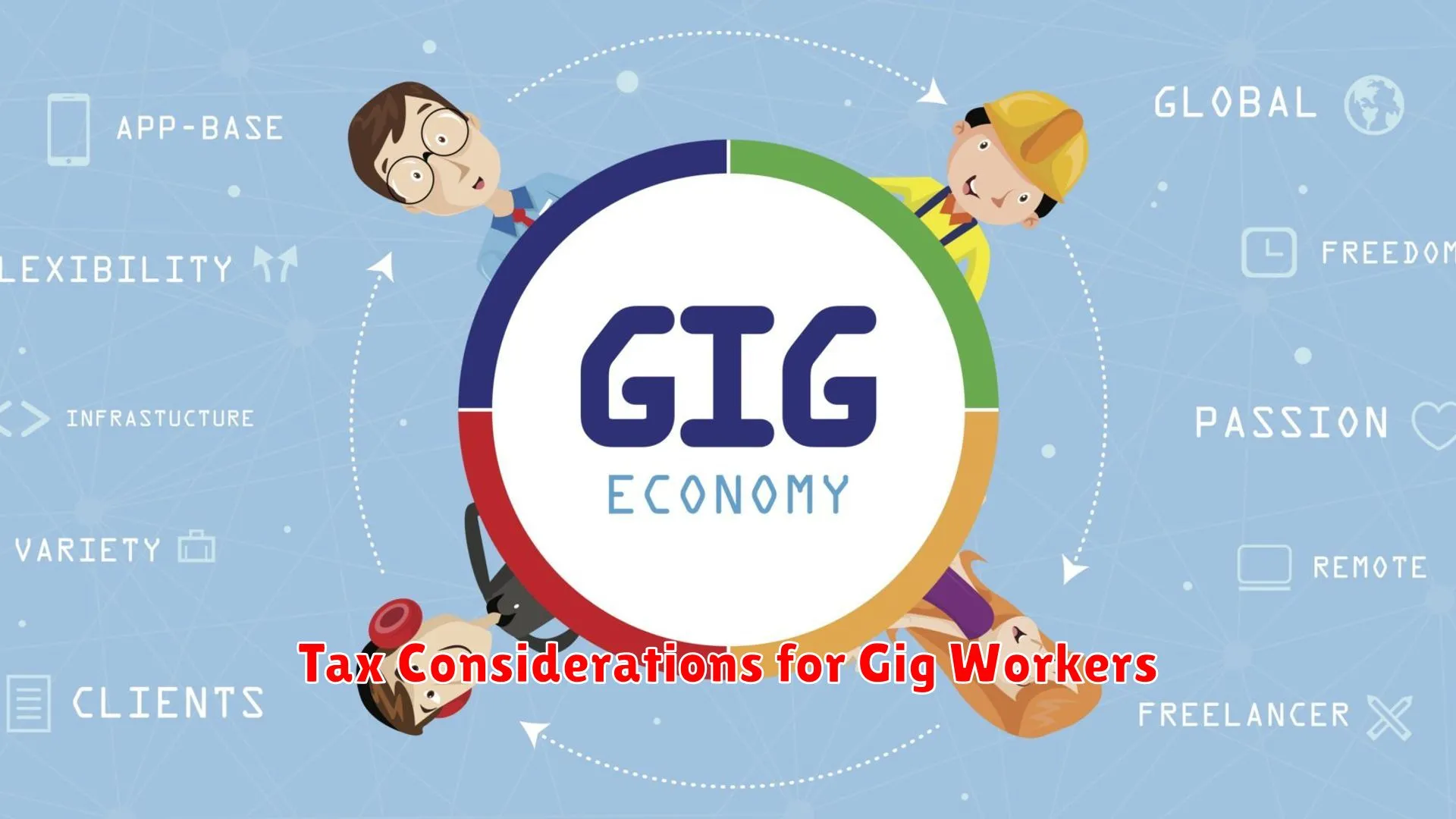In the dynamic world of the gig economy, financial planning is essential for freelancers and contractors. This article delves into expert insights and strategies to help these independent workers navigate the challenges of managing their finances effectively.
Navigating Irregular Income

Managing finances as a freelancer or contractor in the gig economy comes with its unique challenges, particularly dealing with irregular income streams. Here are some strategies to help you navigate through this financial maze:
- Create a Detailed Budget: It’s essential to establish a budget that reflects both your fixed expenses and fluctuating income. Allocate a portion of your earnings to cover essential costs and savings, while leaving some room for variability.
- Build an Emergency Fund: Set aside funds for emergencies to cushion the impact of slow months or unexpected expenses. Aim to save at least three to six months’ worth of living expenses to mitigate financial uncertainties.
- Diversify Income Sources: Consider diversifying your revenue streams by taking on different types of gigs or projects. This can help minimize the impact of income fluctuations and provide some stability.
- Track Your Cash Flow: Monitor your cash flow closely to understand your earning patterns and identify peak seasons. This data can inform your financial decisions and help you allocate funds more effectively.
- Set Realistic Financial Goals: Establish clear financial goals based on your income projections and prioritize them according to your current financial situation. This will help you stay focused and motivated in achieving your objectives.
- Plan for Taxes: As a freelancer or contractor, you are responsible for managing your taxes. Save a portion of your income for tax obligations or consider working with a tax professional to ensure compliance and avoid any surprises.
By implementing these strategies and adopting a proactive approach to financial planning, freelancers and contractors can navigate the challenges of irregular income with greater confidence and stability.
Tax Considerations for Gig Workers

As gig workers, freelancers, and independent contractors navigate the complexities of the gig economy, one crucial aspect that demands attention is tax planning. Given the unique nature of gig work, there are several tax considerations that these individuals should be aware of to ensure compliance and optimize their financial situation.
1. Self-Employment Taxes: Unlike traditional employees who have payroll taxes withheld by their employers, gig workers are typically responsible for paying self-employment taxes. It’s important to set aside a portion of income to cover self-employment taxes, which include contributions to Social Security and Medicare.
2. Estimated Quarterly Taxes: Gig workers often receive income without taxes withheld, necessitating the payment of estimated quarterly taxes to the IRS. Failure to estimate and pay these taxes throughout the year can result in penalties and interest.
3. Deductions and Credits: Gig workers may be eligible for various tax deductions and credits that can help lower their taxable income. This includes deductions for business expenses, such as equipment, supplies, travel costs, and home office expenses.
4. Record Keeping: Maintaining organized and accurate records of income and expenses is essential for gig workers. Detailed records not only aid in maximizing allowable deductions but also serve as documentation in case of an audit.
5. Retirement Savings: Gig workers are responsible for their own retirement planning and should consider utilizing tax-advantaged retirement accounts, such as Individual Retirement Accounts (IRAs) or Solo 401(k) plans, to save for the future while potentially reducing taxable income.
Retirement Planning for Freelancers

When it comes to financial planning for freelancers and contractors, retirement can often be a challenging aspect to navigate. Without the traditional employment benefits like a 401(k) or pension plan, freelancers need to take proactive steps to secure their retirement fund. Here are some essential tips for retirement planning tailored for freelancers:
1. Set Up a Self-Employed Retirement Account
Consider opening a self-employed retirement account such as a Solo 401(k) or a Simplified Employee Pension (SEP) IRA. These accounts allow freelancers to contribute to their retirement savings tax-deferred.
2. Calculate Your Retirement Goals
Estimate your retirement expenses and income needs to determine how much you need to save for retirement. Factor in your desired lifestyle, healthcare costs, and inflation.
3. Establish a Consistent Savings Plan
Set up automatic contributions to your retirement account to ensure regular savings. Consistency in saving is key to building a substantial retirement fund over time.
4. Diversify Your Investments
Spread your retirement portfolio across different asset classes to reduce risk. Consider investing in stocks, bonds, real estate, and other investment vehicles to achieve a balanced and diversified portfolio.
5. Stay Informed and Adapt
Stay updated on changes in the financial markets, tax laws, and retirement planning strategies. Adapt your retirement plan as needed based on your evolving financial situation and goals.
Insurance Needs for Independent Contractors

As an independent contractor in the gig economy, it’s crucial to consider your insurance needs to protect yourself and your business. Unlike traditional employees, independent contractors often don’t have access to employer-provided benefits, including insurance coverage. Here are key insurance types that independent contractors should prioritize:
1. Health Insurance
Health insurance is essential for independent contractors to cover medical expenses in case of illness or injury. With the rising cost of healthcare, having a comprehensive health insurance plan can provide you with financial security and peace of mind.
2. Disability Insurance
Considering the unpredictable nature of freelancing and contracting work, disability insurance can protect your income if you are unable to work due to a disability. It ensures you continue to receive a portion of your income to meet your financial obligations.
3. Liability Insurance
For independent contractors providing services to clients, liability insurance is crucial to protect against potential lawsuits or claims of property damage or injury. It helps cover legal expenses and settlements in case you are held liable.
4. Business Insurance
If you run a business as an independent contractor, business insurance can safeguard your assets and cover risks specific to your industry. This type of insurance can include coverage for equipment, professional liability, and business interruption.
By addressing your insurance needs as an independent contractor, you can mitigate risks and ensure financial stability in an ever-changing gig economy landscape.
Building a Financial Safety Net

One of the essential aspects for freelancers and contractors working in the gig economy is building a financial safety net to navigate the uncertainties that come with variable income streams and fluctuating work opportunities.
Here are some key strategies to establish a solid financial safety net:
- Create an Emergency Fund: Start by setting aside a portion of your income regularly into an emergency fund. Aim to save at least three to six months’ worth of living expenses to cover any unexpected financial setbacks, such as sudden job loss or medical emergencies.
- Diversify Your Income: Explore multiple streams of income to reduce the reliance on a single client or source of work. Diversifying your income sources can provide stability and cushion against potential income fluctuations in the gig economy.
- Set Clear Budgets: Establishing a detailed budget can help you track your expenses, prioritize essential costs, and identify areas where you can cut back during lean months. Being mindful of your spending habits is crucial in maintaining financial stability.
- Invest in Retirement Planning: While freelancers and contractors may not have access to traditional employer-sponsored retirement plans, it’s vital to prioritize long-term financial security. Consider opening a self-directed retirement account, such as an Individual Retirement Account (IRA), and regularly contribute to secure your future.
- Obtain Adequate Insurance: Protect yourself and your assets by securing appropriate insurance coverage, such as health insurance, disability insurance, and liability insurance. Insurance can safeguard you against unexpected expenses and provide peace of mind in times of need.
By proactively building a financial safety net through prudent planning and smart financial choices, freelancers and contractors in the gig economy can better weather financial challenges and achieve greater financial resilience.
Conclusion
Freelancers and contractors in the gig economy must prioritize financial planning to ensure stability and success. Setting aside savings, managing taxes, and investing for the future are essential for long-term financial well-being in this dynamic work environment.

